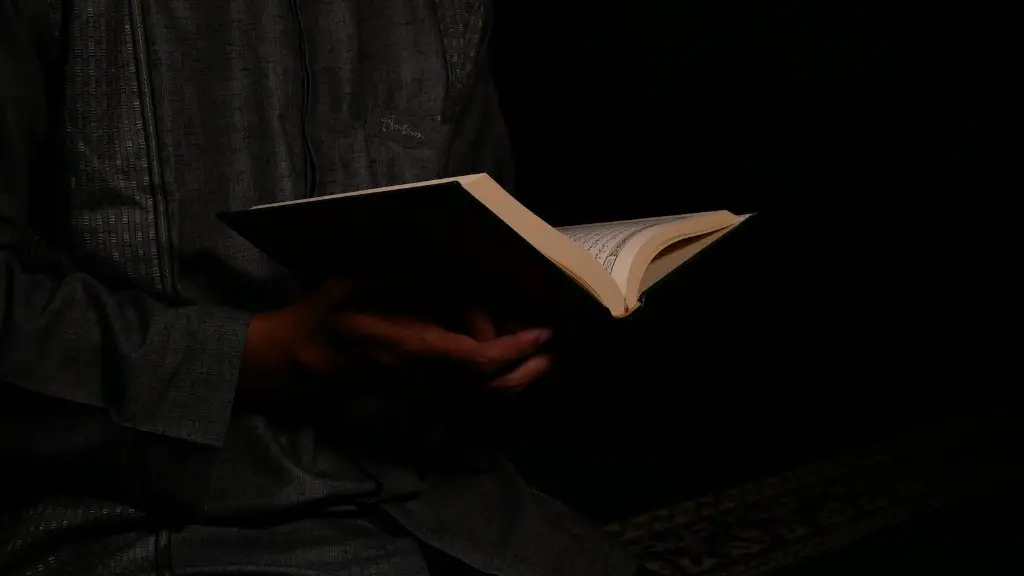Passover is an important Jewish festival celebrated worldwide. It is celebrated to commemorate the liberation of the ancient Israelites from slavery in Egypt and their journey to the Promised Land. Through its observances, families and communities can reconnect with the legacy of their ancestors and affirm the faith of Judaism in their daily lives. Passover is found several times in the Hebrew Bible and has become a cornerstone of Jewish tradition.
The original celebration of Passover took place in the time of Moses, when the Angel of Death passed over the homes of the Israelites while punishing the Egyptians with the tenth plague. This event in Jewish history is so powerful that it has become a recurring holiday, celebrated each year in the springtime on the 14th, 15th, and sometimes the 16th days of Nisan, which is the first month of the Hebrew calendar. According to the Book of Exodus in the Torah, the holiday of Passover is a celebration of freedom and a reminder of the hardships the Israelites faced during their journey to the Promised Land. Passover is an occasion that binds the Jewish people, from antiquity to the present. During Passover, Jewish families, both young and old, gather to celebrate with symbolic foods and traditions.
The preparations and rituals of Passover are complex and very symbolic. Every element is rooted in Jewish religion and history. A key symbol is the Seder plate, or matzah tray, which holds edible symbols that represent key components of the story of the Israelites. There is the shank bone, to represent the Paschal sacrifice; bitter herbs, to represent the tears cried in captivity; a roasted egg, to represent the festival offering in the temple; and matzah, to represent the unleavened bread the Israelites ate when they left Egypt in haste. Each of these symbols, and the meals they are eaten with, calls to mind an ancient story and reminds Jews of the faith their ancestors followed.
The Meaning of Passover
Passover is deeply meaningful for many reasons. It is a chance for families, young and old, to spend quality time together, share food, stories and songs, and celebrate the freedoms of being a Jew. Furthermore, it is an opportunity to pass on the stories and traditions of their ancestors from one generation to the next. It is a reminder to Jews of the importance of community and the miraculous power of God. In addition, during Passover Jews proclaim that sustained faith, love, and resilience can make even the most despairing moments of slavery into joyful freedom.
Passover is an important holiday for Jews worldwide, as it reminds them of their history, brought them unity and marks a celebration of freedom. It is one of the biggest festivals in Judaism, and is celebrated with great enthusiasm. Jews around the world celebrate Passover to remember the exodus of the Israelites from slavery in Egypt, following Moses’ instructions. Modern Jews gather together with family and friends in a ritual known as ‘the seder’, where they eat symbolic foods, sing songs, tell stories and partake in the customs of the holiday. The seder marks the first night of Passover, and its focus is to participate in the traditional retelling of the Jewish story.
The Passover holiday also allows Jews to connect with their past and to affirm their religious identity. It is a chance to engage with the values of their faithand also with the unique qualities of being Jewish. This spiritual awareness closely links Jews to their history and allows them to realize the meanings of their heritage, which includes the story of the Exodus. For many Jews, Passover is also a chance to renew their faith and to reflect upon their identity. The seder is not only a time that celebrates ancient stories and rituals, but is also a chance to pray together, and find joy in the shared identity of Judaism.
The Last Supper
The most significant event associated with the celebration of Passover is ‘the Last Supper’, which is the ritual meal before Jesus’ crucifixion. This ritual was an intensification of the symbols within the Seder meal and brought Passover to a higher level. During this meal Jesus spoke of the importance of remembering him as the Son of God and of linking the Jewish redemption story with his death and resurrection. Therefore, ever since that day, Passover has been of great spiritual importance to Christians, as it marks the event of Jesus’ death, and a time to remember the promises of God.
Passover is an tradition that offers Jews and Christians the opportunity to reconnect with their beliefs and spirituality. It celebrates the teaching of faith, connectedness and freedom that their ancestors clung to and that guides contemporary people today. In its observance, families and communities can experience the emotions and faith found in Jewish history, and can participate in the act of remembrance that passes on a set of communal beliefs, defining what it means to be a Jew or a Christian.
Passover, with its message of freedom, liberty, and hope for the world, is an important holiday, underscoring the values and beliefs of many Jews and Christians alike. It is a holiday of joy, moving from slavery to freedom and from darkness to light, strengthening faith, celebrating liberation, and reminding the world of love in the face of adversity. The festival is a time for reflection and a chance to celebrate anew the miracles, faith and courage of the past.
The Ancient Heritage of Passover
Passover is one of the oldest continuously observed holidays in the world. The festival dates to Biblical times and has been a cornerstone of the Jewish faith for centuries. It is a celebration of liberation and a reminder of the harsh oppression faced by the ancestors of the Jewish people. Passover has a timeless quality to it, with its key symbols, the Seder plate and Matzah, representing ancient Judaism and storytelling. Passover provides an opportunity for people of all ages to interact with the ancient heritage of their faith and to affirm its principles.
Jewish families have kept alive the story of the Exodus and celebrated Passover throughout the centuries. The solemnity of the Passover ceremonies stands as an everlasting testament to the burdens endured by the Israelites and to their continued endurance. Jewish parents use Passover to instruct their children about the faith and its history, through storytelling, music, and other rituals. And regardless of geographic distance, Jews everywhere can continue to take part in the age-old traditions of their faith, as each Passover observance is a link connecting Jews across the world with their past.
Passover is an enduring holiday that has withstood the test of time. Through its practices, Jewish families recall the experiences of the Israelites in Egypt and the miracles they experienced during their journey through the desert. The hard-won legacy of hope, freedom and redemption embodied in Passover is a powerful reminder of the faith and perseverance of the Jews of antiquity and of the Jews of today.
The Significance of Passover in Modern Times
Nowadays, Passover is a time to understand and appreciate the nation of Jews and their history and culture. Every night of Passover, people around the world gather in homes to recite the story of the Exodus, using God’s words as spoken in the Torah. Through the ritual of drinking four cups of wine, eating bitter herbs, asking questions, singing songs, and eating symbolic foodstuffs, families, friends and congregations continue to celebrate passover, linking their celebration with those of ago. As modern people of faith, Jews and Christians alike, use Passover as a spiritual renewal, encouraging all to remember God’s promises and miracles.
This celebration emphasizes faith, compassion, trust and gratitude. Jews gather to remember and rejoice in the miracles that God has granted them throughout the ages. As their faith has endured, so too has their pride in celebrating Passover. Every year Jews around the world look forward to the holiday with an undeniable sense of excitement and joy, to engage with the stories of the past, honor their forebears, and renew the promises of hope. Jews have kept the traditions of Passover alive for generations, and will continue to do so, to recognize and uphold the freedom and redemption that God has provided them.
Passover is an occasion to celebrate the freedom, blessings, and miracles that God has bestowed upon the Jews since ancient times. It is a reminder for all of us that faith and resilience can help us survive the toughest of times. Passover is an especially important holiday in the modern world, when religious divisions are on the rise and hatred is rampant, to show that all religions can and should work together to create lasting peace. Passover offers all a chance to come together and reflect on their faith and their place in the world.
Contemporary Celebrations of Passover
As the ceremonies of Passover have endured, over time the Seder itself has evolved, to reflect the changing times of Judaism. For instance, some Jews choose to add additional rituals that celebrate modern freedoms and achievements. This includes prayers for peace throughout the world, for equal rights for all, and for gratitude for new nations that were created in the wake of World War II. Other changes in modern Passover celebrations include the inclusion of songs and stories from the diaspora, which are different from the traditional stories and songs heard in the Middle East.
Modern Passover celebrations combine ancient rituals with contemporary stories and songs to mark the freedom and redemption of the Jewish people. From commemorating the flight from slavery to affirming faith, Passover allows its participants to experience the profound nature of Jewish history. The meals and other traditions of Passover draw Jews together in celebration, as they retell the stories of the past and renew their faith in the promises of God.
Passover gives all people, religious or not, a chance to celebrate the beauty and resilience of the human spirit. Throughout the ages, the Jews have endured tough times and discouraging waters and yet, they have always emerged triumphant. Passover is a reminder of the hope of good times to come and of God’s miracles that reveal his everlasting mercy and care.



